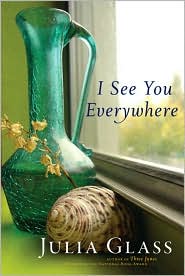 I See You Everywhere by Julia Glass comes by its title in a hilarious scene set in a hospital. There are two sisters. Clem, the younger and more reckless one, gets into a serious accident and winds up in the hospital. Louisa the older one, more concerned with living responsibly, more desirous of life's conventional joys gets the news of Clem's accident from their mother. It is Clem's voice narrating Louisa's story:
I See You Everywhere by Julia Glass comes by its title in a hilarious scene set in a hospital. There are two sisters. Clem, the younger and more reckless one, gets into a serious accident and winds up in the hospital. Louisa the older one, more concerned with living responsibly, more desirous of life's conventional joys gets the news of Clem's accident from their mother. It is Clem's voice narrating Louisa's story:Louisa's smart, smarter than me in the report-card sense, but whenever she's nervous, she babbles. Today, day two of my renewed consciousness, she's worse than ever, as if she's burning off extra fuel. I guess she's just glad I'm alive, and if I weren't so drugged up, I hope I'd be touched. "So I get home," she's saying. "Hugh's already asleep, I've had too much wine, and what do I find on the machine but one of Mom's classic soliloquies. Something like 'Clem's been in a serious accident, honey, I'm not at home because I'm here with her and your father's back and forth because there's a hurricane off Bermuda - Ethan or Efram, I think; your father says it's a bad sign that here we are not even August and already up to E. C and D passed us by, but B was a very close call. Great for the roses, though. You can't speak to her, I'm afraid, but call this number, I'm giving you this number, just a second, hang on, it's here in my purse. Is it as hot down there as it is up here? Yes, here it is, right, so call and say you love her. Will you do that, please? She can't talk, but have them leave her a message, I'll call you later,'"And that sums up this lovely book perfectly both in its form and its content. It is a series of chapters, each separated by three years, that track the lives of the two sisters. Glass writes each chapter alternately in Clem's voice and then Louisa's. Many of the chapters, like this one, have a stand-alone, short story quality to them. I believe that is the form that they first existed in. In each one it is apparent not just how completely different the two sisters are as people, but how much they depend on each other to define themselves. Glass has made the sister's voices and points of view distinct, but my one quibble with the book as a novel is that I sometimes find the tone of the chapters too various to hang together. But then I find myself justifying that in the changes in Clem and Louisa's circumstances, their age, their relationships, the settings, and the fact that time elapses between each chapter that we don't witness first hand and regardless, they are a pleasure to read.
Louisa stops pacing. So of course I have no idea where 'here' is or who 'they' are, but I call the number, I'm frantic, and this woman answers, 'I see you?' as if I'm expected to answer, 'Aha, but I see you, too!' Like a game of some kind. All I can say is 'You see me? How?' and she laughs. 'That's a new one,' she says. 'This is intensive care,' and I freak out. I can't believe she's laughing."
"That's cute," I say. "Like, ICU in my dream. ICU on the Johnny Carson show. ICU everwhere."
"More like, ICU every time all hell breaks loose. For both of us."
The scene I excerpted is also emblematic of this book because what you get at first hearing is not really not what is being said. You might think you're reading another little monologue in the voice of the risk averse sister, and you are. But what you are really reading is a small part of complex novel that is an even smaller part of each of these sisters' lives, we only see the parts when they are thrust together "every time all hell breaks loose," as Clem says, It is told through accumulation, through repetition and variation until you finally realize you are reading something you didn't expect, 'I.C.U.' and not 'I see you.' Although both are equally true. I'm not quite finished with it, but three quarters of the way through Glass has created a warm and touching book whose characters feel deeply real and that lets its pleasures emerge quietly out of character study.
















2 comments:
I realize that when the story unfolds (over 20 years I believe), the voices of the sisters become "even out", Clem's assimilating to the more aplomb Louisa when she was younger. The alternating narratives sport the love-and-hate dynamics between the two sisters.
I think that Glass is really skilled in writing connected stories, which is what this novel sounds to be. Three Junes works very well, I think, because the stories are almost completely self-contained, but cross over enough to give us the impression of a novel's interweaving.
I've been wanting to read this one as well, but need to order a copy first.
Post a Comment